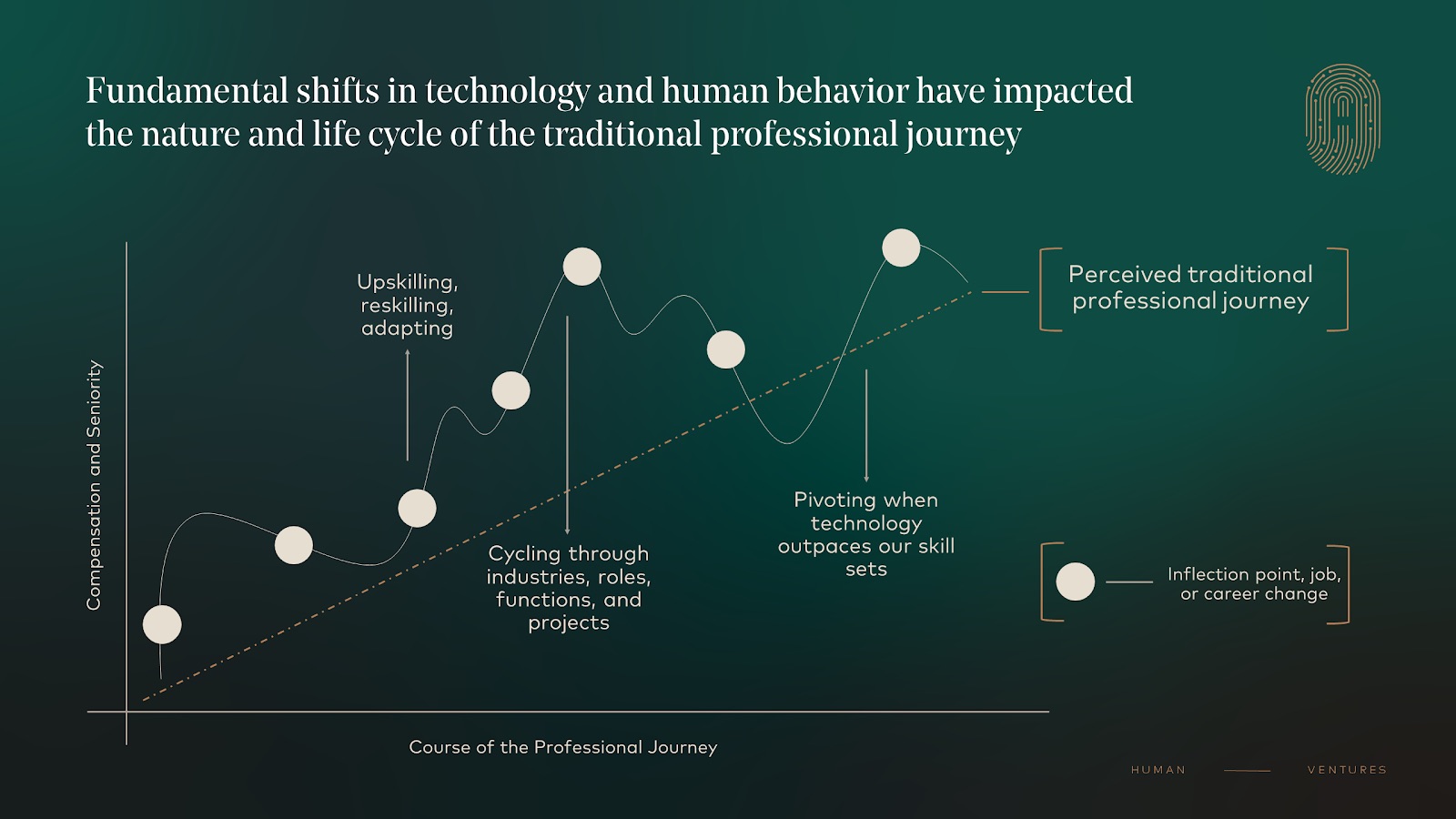Heather Hartnett
More posts from Heather Hartnett
Human Ventures builds and invests in what we call the “human needs economy,” which encompasses products and services that address material human problems — specifically those in the areas of health and wellness, the future of work and community. This spring, our Humans in the Wild cohort program brought together a group of exceptional entrepreneurs, building companies within health and wellness. This fall, we are excited to call upon entrepreneurs who are building companies reimagining the way in which we, as humans, work. Applications are open here.
The human needs economy is the future. Throughout the last few decades, fundamental shifts in technology and human behavior have impacted the nature and life cycle of the “traditional” professional journey — and that disruption has started to shape a new labor economy. The past decade specifically has brought significant technological advancements that help humans work more efficiently, and share and organize information at scale. However, those technological advances are now starting to outpace the human condition, creating a society weary of automation, one that finds individuals searching for their place and purpose in an increasingly competitive and fast-paced labor market.
As COVID-19 saw boardrooms go dark, turning homes into makeshift offices, nascent trends were forced into prominence. Abruptly, the labor force was newly eager for innovative solutions to help them thrive in the new normal. But there is a long way to go before this new normal feels normal. There’s much work to be done to help the human needs economy not just survive this seismic shift, but to use it as an advantage.
Human Ventures has identified four areas of opportunity best positioned to serve the human side of work over the next decade:

If you are building in these areas, we would love to connect with you.
1. New work environments
We are witnessing a movement away from traditional office environments, work settings and collaboration spaces. This trend has been building for years. The past decade has proven demand for co-working spaces, flexible office setups and working remotely, with 62% of businesses worldwide boasting flexible work policies. And COVID-19 has accelerated this trend, with 25-30% of the workforce now expected to work from home by the end of 2021.
Additionally, growth in the gig economy, freelancing and project-based work has caused a rise in alternative workers — with 47% of workers under the age of 38 doing some form of freelance work. The transition to flexible work has been supported by technology that facilitates remote collaboration, communication and sharing. Such technology includes digital payment systems, document sharing through the cloud, messaging platforms and data security solutions. These advancements have met and exceeded the needs of businesses of all kinds. But the next wave of technological advancements will focus on meeting the needs of the workers themselves — improving their lives within these new work environments.
2. Lifelong learning
The fourth industrial revolution will require better human skills from the global workforce. Critical thinking, ideation, emotional intelligence and creativity are in peak demand. Yet, while demand for a new set of skills is becoming apparent, workers and employers are not adapting fast enough. Only 16% of private-sector business leaders feel very prepared to address the skills gap. By 2030, we can expect a global talent shortage of 85.2 million people, with significant shortages in the financial services, technology and media, and manufacturing industries. Workers’ learning needs are changing. Different skills are needed at a quicker pace. Traditional methods of skilling and reskilling cannot keep up without innovative approaches and tools to meet these new challenges.
The key to closing this talent gap is lifelong learning — making learning a way of life for individuals. Lifelong learning includes professional development, education, reskilling and upskilling. For both employers and employees, lifelong learning is an investment in an individual’s raw potential.

Treating learning as a lifestyle, rather than a one-time achievement, will better prepare individuals to adapt to new positions and roles throughout their professional journey. And both employees and businesses will reap the benefits.
3. Redefining the resume
While automation and other technological developments will continue to replace certain jobs, there will always be human competencies that cannot be automated. Emotional intelligence, for example, will always be invaluable and irreplaceable. Attributes like social capital, self-awareness, leadership and adaptability are crucial for the workforce of the future. Yet these qualities are underrepresented and undervalued on the modern resume.
Workers and employers alike need an approach to consistently identify, communicate and measure qualities and experiences that, until now, have not typically been found on a resume. Furthermore, we need to help individuals understand their progress in these areas — help them see how they map to success in certain types of work and improve their ability to learn desirable skills. A new set of tools and methodologies must emerge to support a holistic understanding of professional and personal qualities and how they relate to career opportunities.
4. Worker well-being
In recent years, both employees and employers have renewed their focus on personal well-being. While 80% of organizations say worker well-being is important for short-term success, just 12% say they are ready to improve in this area. Throughout society, off-balance-sheet talent is growing and the gig and passion economies are increasing in popularity. This shift reflects a transformation in how humans view work — we no longer see it as just a source of pay, but as an avenue for fulfillment. And for better or for worse, there’s no denying that these sentiments have disrupted the established relationship between the individual and the employer.
The needs of alternative workers are shaping companies’ human capital concerns and creating new expectations for employers to do more than compensate, but also to behave ethically, fairly and with social activism. Yet here too, there’s a gap between what organizations believe they need for success, and what they are capable of achieving. Roughly 75% percent of organizations believe ethics are important for their success over the next 12 to 18 months related to the future of work, but only 14% say they are very ready to address this trend.
As the nature of work changes and employees demand that their employers do better, companies are looking to raise the bar. Which is why, here at Human Ventures, our entrepreneurs are poised to do exactly that.































Comment